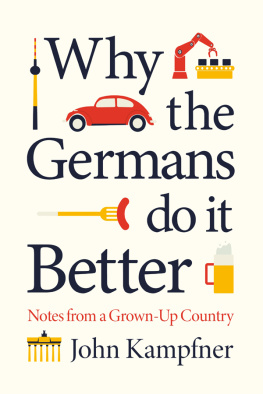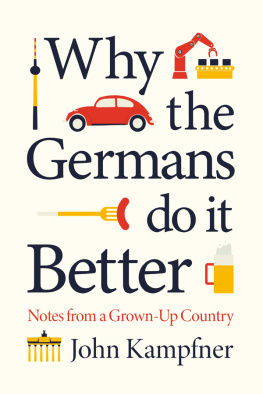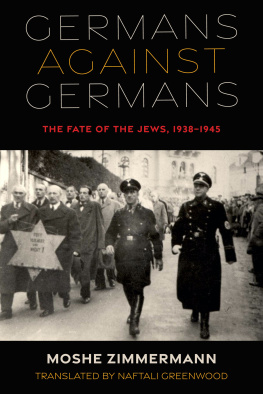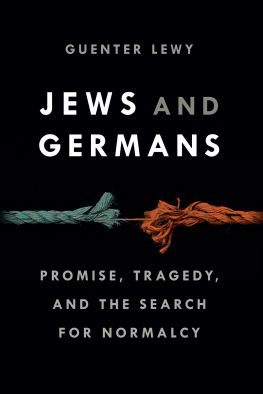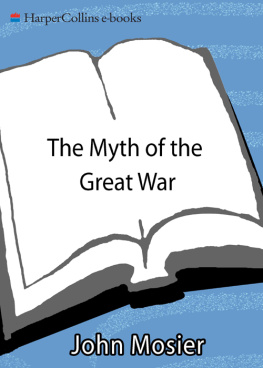John Kampfner - Why the Germans Do It Better
Here you can read online John Kampfner - Why the Germans Do It Better full text of the book (entire story) in english for free. Download pdf and epub, get meaning, cover and reviews about this ebook. publisher: Lightning Source Inc. (Tier 3), genre: Politics. Description of the work, (preface) as well as reviews are available. Best literature library LitArk.com created for fans of good reading and offers a wide selection of genres:
Romance novel
Science fiction
Adventure
Detective
Science
History
Home and family
Prose
Art
Politics
Computer
Non-fiction
Religion
Business
Children
Humor
Choose a favorite category and find really read worthwhile books. Enjoy immersion in the world of imagination, feel the emotions of the characters or learn something new for yourself, make an fascinating discovery.
- Book:Why the Germans Do It Better
- Author:
- Publisher:Lightning Source Inc. (Tier 3)
- Genre:
- Rating:3 / 5
- Favourites:Add to favourites
- Your mark:
- 60
- 1
- 2
- 3
- 4
- 5
Why the Germans Do It Better: summary, description and annotation
We offer to read an annotation, description, summary or preface (depends on what the author of the book "Why the Germans Do It Better" wrote himself). If you haven't found the necessary information about the book — write in the comments, we will try to find it.
Why the Germans Do It Better — read online for free the complete book (whole text) full work
Below is the text of the book, divided by pages. System saving the place of the last page read, allows you to conveniently read the book "Why the Germans Do It Better" online for free, without having to search again every time where you left off. Put a bookmark, and you can go to the page where you finished reading at any time.
Font size:
Interval:
Bookmark:

Why the
Germans
Do it Better
Smart, provocative and entertaining, this is a timely and enthralling
love letter to our much misunderstood near neighbour.
Kay Burley, presenter, Sky News
Kampfners admiration of what post-war Germany has achieved
doesnt blind him to her imperfections. The book abounds with
sharp analysis and telling anecdotes. Lively and very readable.
David Lidington, former Lord Chancellor
and UK Secretary of State for Justice
JOHN KAMPFNER is an award-winning author, broadcaster and foreign-affairs commentator. He began his career reporting from East Berlin (during the fall of the Wall) and Moscow (during the collapse of communism) for the Telegraph. After covering British politics for the Financial Times and BBC, he edited the New Statesman. He is a regular TV and radio pundit, documentary maker and author of five previous books, including the bestselling Blairs Wars.

First published in hardback in Great Britain in 2020 by
Atlantic Books, an imprint of Atlantic Books Ltd.
Copyright John Kampfner, 2020
The moral right of John Kampfner to be identified as the
author of this work has been asserted by him in accordance
with the Copyright, Designs and Patents Act of 1988.
All rights reserved. No part of this publication may be
reproduced, stored in a retrieval system, or transmitted in any form
or by any means, electronic, mechanical, photocopying, recording,
or otherwise, without the prior permission of both the copyright
owner and the above publisher of this book.
1 3 5 7 9 1 0 8 6 4 2
A CIP catalogue record for this book
is available from the British Library.
Hardback ISBN: 978 1 78649 975 2
Trade paperback ISBN: 978 1 83895 976 9
E-book ISBN: 978 1 78649 977 6
Printed in Great Britain
Atlantic Books
An imprint of Atlantic Books Ltd
Ormond House
2627 Boswell Street
London
WC1N 3JZ
www.atlantic-books.co.uk
To my late parents, Betty and Fred, who, in their
different ways, saw Germany at its worst during the War
I n January 2021, Germany will be 150 years old, but its people will have little desire to mark this milestone. Germany from the time of Bismarck to that of Hitler is synonymous with militarism, war, the Holocaust and division. No country has caused so much harm in so little time.
And yet, two nearby anniversaries tell a different history. In November 2019, millions celebrated thirty years since the Berlin Wall came down. In October 2020, three decades will have passed since reunification. Half of modern Germanys lifespan has been a tale of horror, war and dictatorship. The other half is a remarkable tale of atonement, stability and maturity. No country has achieved so much good in so little time.
As much of the contemporary world succumbs to authoritarianism, as democracy is undermined from its heart by an out-of-control American president, a powerful China and a vengeful Russia, one country Germany stands as a bulwark for decency and stability.
This is the other Germany. This is the story I wish to tell.
Those with longer memories struggle to accept the notion of Germany as a moral and political beacon. I want to compare all parts of this society with others, particularly my own, Britain. It will discomfort those still obsessed with Churchill and the Blitz spirit. Germanys constitution is strong; political debate is more grown-up; economic performance has for much of the post-war era been unrivalled.
Which other nation could have absorbed a poor cousin with so little trauma? Which other nation would have allowed in more than a million of the worlds most destitute?
Germany faces many problems. The refugee influx has exacerbated cultural divide. Faith in established political parties is waning. Many, particularly in the East, have turned to the simple slogans of the extremes. The economy has slowed, weighed down by an excessive focus on exports, particularly to China, an ageing population and worsening infrastructure. At a time when Europe and the democratic world desperately needs leadership, Germany has been reluctant to meet its foreign-policy responsibilities.
And then the country was hit by another crisis. In early 2020, COVID-19 came to Europe, a pandemic that killed hundreds of thousands, shattered economies and destroyed millions of lives and livelihoods. It also forced people around the world locked down wherever they lived to reassess their priorities and to look again at the role of the state and society. Life would eventually return to normal, but it became axiomatic to ask: what is the new normal?
So why the confidence, why the faith? The measure of a country or an institution or individual for that matter is not the difficulties they face, but how they surmount them. On that test, contemporary Germany is a country to be envied. It has developed a maturity that few others can match. It has done so not because of a preordained disposition. It has learnt the hard way.
Coronavirus provided the ultimate test of leadership. Angela Merkel, after 15 years in office, rose to the challenge. Empathetic, dogged, she told Germans in precise detail the sacrifices they would have to make and the emergency laws her government would have to impose something that was extraordinarily sensitive in light of the countrys history. She told citizens what she, her ministers and scientists knew and what they didnt. She never blagged. She never boasted. Most of the decisions she was forced to take went against everything modern Germany stood for. The closing of borders showed how easily the great dream of free travel across the continent might end. A people fearful of giving their information to the state was asked to sign up to being tracked and traced. Yet Merkel knew she had no choice.
On the other hand, Britain provided a case-study of how not to deal with a crisis. The bombast of the recently-elected prime minister was in inverse proportion to his governments competence. Boris Johnson was slow to grasp the seriousness of the problem. Even though a pandemic was listed as one of the highest-priority dangers facing the country in the UK governments 2015 National Strategic Defence and Security Review, almost no preparations had been made. With a mixture of libertarianism and English exceptionalism, the prime minister declared that with good old-fashioned pluck, Britain would get through it. However, despite witnessing the tragic advance of the virus in Italy, societal restrictions were slow to be implemented. The British also faced a crisis in their provision of testing and personal protective equipment (PPE). All in all, the UK could not have alighted upon a leader less qualified to deal with a situation that required methodical attention to detail. Johnson had engineered his ascent to power through a flexible relationship with the truth and a reliance on bluster.
It was desperately sad but no surprise that so many died. Care homes became death traps. By May 2020, Britain found itself in the ignominious position of having the highest death toll in Europe. Germany, having tested a large cross-section of its population, had a high number of recorded cases. But the death rate, as a proportion of the population, was tiny compared to that of the UK (and most of Europe), even with an ageing populace.
Font size:
Interval:
Bookmark:
Similar books «Why the Germans Do It Better»
Look at similar books to Why the Germans Do It Better. We have selected literature similar in name and meaning in the hope of providing readers with more options to find new, interesting, not yet read works.
Discussion, reviews of the book Why the Germans Do It Better and just readers' own opinions. Leave your comments, write what you think about the work, its meaning or the main characters. Specify what exactly you liked and what you didn't like, and why you think so.

